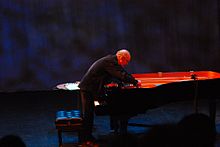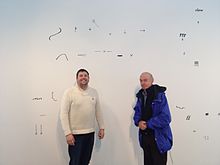Christian Wolff (composer)
Christian Wolff (born March 8, 1934 in Nice ) is an American composer with German parents. He studied classical philology at Harvard University and taught the subject and music until his retirement at Dartmouth College in New Hampshire.
Live and act
Christian Wolff was born in France as the son of the publisher couple Helen and Kurt Wolff , but grew up in the USA , where he spent his school days in New York from 1941 . Since 1948 he had piano lessons with Grete Sultan , who had been recommended to his parents by the pianist Katja Andy . When he showed his first compositions to Grete Sultan in 1950, she said that he should take lessons from John Cage , with whom she was close friends. Through her, at the age of 16, he got to know the composer John Cage and his circle, including Morton Feldman , Earle Brown , the pianist and composer David Tudor , the dancer and choreographer Merce Cunningham , but also painters such as Robert Rauschenberg and Mark Rothko or Philip Guston .
Wolff gave Cage the book I Ching that his father had published. The book had a decisive influence on Cage's further compositional practice. Wolff was the youngest in a group of musicians and composers who, following the New York School of the aforementioned painters of Abstract Expressionism - the first American art form after jazz to be created independently from Europe - were soon named as well, and whose most outstanding minds were Cage, Feldman , Brown and Wolff were.
Wolff, influenced by Cornelius Cardew , became involved politically from the late 1960s, which was reflected in a number of works. Examples are Accompaniments for a singing pianist with texts from the book China: The Revolution Continued , Bread and Roses for violin based on the women's movement song of the same name or the Peace Marches series . He also worked as a pianist and guitarist in the field of improvisation music.
Wolff received his doctorate in classical philology and has been a lecturer since 1962, from 1976 professor at Dartmouth College in Hanover / New Hampshire; In addition to classical philology, he also taught music there. In 1972 he directed a course at the Darmstadt Summer Courses .
Wolff has been a member of the Berlin Academy of the Arts since 1999 . In 2005 he was elected to the American Academy of Arts and Sciences .
Selection of works

- Duo for Pianists I, II (1957, 1958)
- For 1, 2, or 3 people (1964), free line-up
- Edges (1968) for any number of players
- Prose Collection (1968–1971, supplemented in 1986 and 1997) in any ensemble size
- Burdocks (1970–1971) for one or more groups of players
- Changing the System (1973–1974) for eight or more players
- Exercises (1973–) for various instruments
- Wobbly Music (1975–1976) for choir, keyboard, guitar and melody instruments
- "I Like to Think of Harriet Tubman " (1985) for female voice and instruments
- Eight Days a Week Variation (1990) for piano
- Percussionist Songs (1994–1995) for percussion solo or in a duet
- Pianist - Pieces (2001) for piano solo
- Ordinary Matter (2001–2004) for three orchestras
- John Heartfield (Peace March 10) (2002) for four or more players
- Microexercises (2006) for one or more players
- Encouragement (2016) for string orchestra and percussion; Commissioned by the Munich Chamber Orchestra
- Trio IX (Accanto) (2017) for baritone saxophone, percussion and piano; Commissioned by the Trio Accantos
- Voices (2016/2018) for two choirs; Commissioned by the SWR
Texts
- Cues. Writings & Conversations / Notes: Writings and Conversations , ed. by Gisela Gronemeyer and Reinhard Oehlschlägel, Cologne: Edition MusikTexte , 1998.
- On political texts and new music , in: MusikTexte 4, April 1984, 52–57.
- Open to whom and what. On the theory of open form in new music , in: MusikTexte 32, December 1989, 28–32.
- What is our job About experimental music today , in: MusikTexte 55, August 1994, 22–28.
- "You have to change your life". Music - Experiment - Education , in: MusikTexte 103, November 2004, 21–30.
conversations
- a world that would be oriented differently. christian wolff in conversation with martin daske , in: MusikTexte 4, April 1984, 40–45.
- "Yes I can do that". Christian Wolff in conversation with David Patterson , in: MusikTexte 76/77, December 1998, 8–24.
further reading
- Peter Niklas Wilson : A Compendium of Useful Dispositions. Christian Wolff's “Long Peace March” , in: MusikTexte 32, December 1989, 39–41.
- (2001) Robert Carl, Christian Wolff: On tunes, politics, and mystery , in: Contemporary Music Review. Issue 4, pp. 61-69.
- (2002) Frank J. Oteri, A chance encounter with Christian Wolff , in: NewMusicBox [United States]; 3/11: 35; Mar. http://www.newmusicbox.org/page.nmbx?id=35fp00
- (2004) Stephen Chase & Clemens Gresser, Ordinary Matters: Christian Wolff on his Recent Music , in: Tempo 58/229 (July), pp. 19-27.
- Stephen Chase (ed.): Changing the system: the music of Christian Wolff , Farnham [u. a.]: Ashgate, 2010, ISBN 978-0-7546-6680-6
- Moritz von Bredow: rebellious pianist. The life of Grete Sultan between Berlin and New York . (Biography, 368 p., 60 figs. - Many references to Christian Wolff, John Cage and the New York musical life) Schott Music , Mainz, 2012. ISBN 978-3-7957-0800-9
- (2013) Dominik Pensel, Open to Whom and to What? On the topicality of Christian Wolff's theory of the open form , in: Positions 95 (May), pp. 39–42.
Web links
- Vita and catalog raisonné (Akademie der Künste)
- List of works
- Texts by and about Christian Wolff in the magazine MusikTexte
- Interview with Christian Wolff in VAN magazine
- Christian Wolff at Discogs (English)
Individual evidence
| personal data | |
|---|---|
| SURNAME | Wolff, Christian |
| BRIEF DESCRIPTION | American composer and philologist |
| DATE OF BIRTH | March 8, 1934 |
| PLACE OF BIRTH | Nice |
